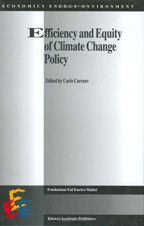Efficiency and equity of climate change policy

01.01.2000
Carlo Carraro
Kluwer Academic, Series on Economics, Energy, Environment
The book is a comprehensive assessment of the economic effects of
climate change policy, addressing the issues with a quantitative
modelling approach. The book thus goes beyond the usual statements on
the efficiency of economic instruments to identify the way gains and
losses are distributed; who gains and who loses. Both the costs and
benefits of climate change policies are analyzed. Most papers also
provide useful information on the economic features of the Kyoto
Protocol, its possible extensions, and the effect of different
implementation strategies (such as the debate on emissions trading
ceilings).
Contributors: P. Vellinga, C. Carraro, J. Shogren, A.S.
Manne, R. Richels, J.C. Hourcade, T. Le Pesant, P. Bohm, P. Buonanno,
et al., J. Albrecht, A. Michaelowa, M. Stronzik, C. Böhringer, et al.,
Jeppesen, L. Nielsen, A.Z. Rose, B. Stevens, R. Tol, F. Bosello, et al.,
J. Alcamo, J. Onigkeit, R. Gerlagh, A. Goria
The book is a comprehensive assessment of the economic effects of climate change policy, addressing the issues with a quantitative modelling approach. The book thus goes beyond the usual statements on the efficiency of economic instruments to identify the way gains and losses are distributed; who gains and who loses. Both the costs and benefits of climate change policies are analyzed. Most papers also provide useful information on the economic features of the Kyoto Protocol, its possible extensions, and the effect of different implementation strategies (such as the debate on emissions trading ceilings).
Contributors: P. Vellinga, C. Carraro, J. Shogren, A.S. Manne, R. Richels, J.C. Hourcade, T. Le Pesant, P. Bohm, P. Buonanno, et al., J. Albrecht, A. Michaelowa, M. Stronzik, C. Böhringer, et al., Jeppesen, L. Nielsen, A.Z. Rose, B. Stevens, R. Tol, F. Bosello, et al., J. Alcamo, J. Onigkeit, R. Gerlagh, A. Goria
